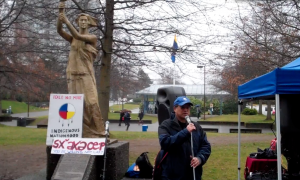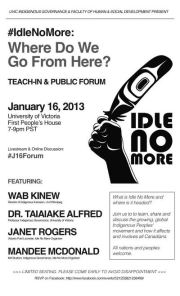New Westminster News Leader, Grant Granger, February 19, 2013 — The Idle No More First Nations movement arrived at Douglas College’s New Westminster campus on Tuesday.
At a rally organized by the Douglas Students’ Union, speakers called for the federal government to abandon its omnibus Bill C-45 that many First Nations leaders believe will pave the way for pipelines and other infringements on native land, native rights and the environment throughout the country.
“This act is pretty much going to erase all of our strides as aboriginal people,” Mique’l Dangeli, a UBC doctoral student doing a PhD in First Nations studies, told the gathering. “They pretty much clear the way for Enbridge to exploit our lands without consultation with the First Nations especially on our reservations.”
Dangeli grew up in Metlakalta, Alaska on Annette Island just south of Ketchikan while her husband Mike was raised a short distance away on land that straddled the U.S.-Canadian border. They now live in Burnaby.
“These huge (omnibus) bills bury the issues,” said Mique’l.
The Idle No More Movement was started in Saskatoon in November by Jessica Gordon, Sylvia McAdam, Sheelah McLean and Nina Wilson to call attention to the damage the legislation could do to First Nations rights and lands, as well as to the environment. It has spread across the country and also received international attention with solidarity protests supporting the cause in the United States, Stockholm, London, Berlin, Auckland and Cairo.
“It took meticulous reading by those four women to realize the implications,” Dangeli told the audience of about 200 in the Douglas College atrium.
Dangeli’s husband Mike, an artist, carver, dance group leader and business manager, said the legislation should concern everybody because Prime Minister Stephen Harper’s government wants to be able to make moves however the Conservative majority sees fit.
“They’re getting rid of protected lakes and streams to make way for pipelines,” said Mike, whose powerful voice and loud drum boomed throughout the cavernous atrium as he spoke, and performed a traditional song and dance. “It’s not about yes or no [to the projects], it’s about asking. How would you feel if they wanted to put it right through your backyard or your front yard for that matter?”
And it could be even in the backyard he lives in now, considering Kinder Morgan is proposing an expansion of its Alberta-to-Burrard Inlet pipeline which could mean coming right through Robert Burnaby Park, he said.
Douglas College student Sheena Wong, one of the event’s organizers, was dressed in a traditional red-and-black cloak as she rallied the crowd.
“They’re selling our land to foreign countries,” said Wong. “I will not stand by and watch him (Harper) sell our land out from underneath us.”
Organizer Madison Paradis-Woodman said the intent of the event was to educate everyone of how the changes in social and environmental policy will affect all walks of life. He estimated there were 350 people throughout the day who absorbed the positive energy of the speakers, the drummers and the singers.
“I have never felt so proud to be an indigenous person. If anything this movement is proof of the power we can receive when we stand not behind people but in front of people and stand for environmental and social justice,” he said. “Just seeing people from all walks of life come out and participate and take something out of it, that made me feel good inside.”
Read More: New Westminster News Leader

 Follow
Follow

